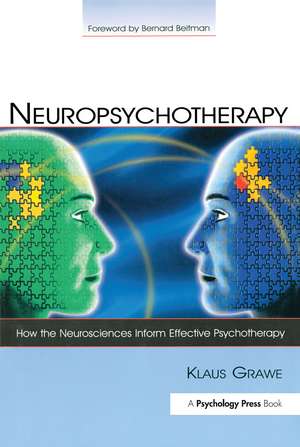Neuropsychotherapy: How the Neurosciences Inform Effective Psychotherapy: Counseling and Psychotherapy
Autor Klaus Graween Limba Engleză Paperback – 14 aug 2006
Profoundly important and innovative, this volume provides necessary know-how for professionals as it connects the findings of modern neuroscience to the insights of psychotherapy. Throughout the book, a new picture unfolds of the empirical grounds of effective psychotherapeutic work. Author Klaus Grawe articulates a comprehensive model of psychological functioning-consistency theory-and bridges the gap between the neurosciences and the understanding of psychological disorders and their treatment.
Neuropsychotherapy illustrates that psychotherapy can be even more effective when it is grounded in a neuroscientific approach. Cutting across disciplines that are characteristically disparate, the book identifies the neural foundations of various disorders, suggests specific psychotherapeutic conclusions, and makes neuroscientific knowledge more accessible to psychotherapists. The book's discussion of consistency theory reveals the model is firmly connected to other psychological theoretical approaches, from control theory to cognitive-behavioral models to basic need theories.
| Toate formatele și edițiile | Preț | Express |
|---|---|---|
| Paperback (1) | 515.41 lei 3-5 săpt. | +38.95 lei 4-10 zile |
| Taylor & Francis – 14 aug 2006 | 515.41 lei 3-5 săpt. | +38.95 lei 4-10 zile |
| Hardback (1) | 1742.94 lei 6-8 săpt. | |
| Lawrence Erlbaum Associates Inc – 31 iul 2006 | 1742.94 lei 6-8 săpt. |
Preț: 515.41 lei
Preț vechi: 542.54 lei
-5% Nou
Puncte Express: 773
Preț estimativ în valută:
98.64€ • 102.60$ • 81.43£
98.64€ • 102.60$ • 81.43£
Carte disponibilă
Livrare economică 25 martie-08 aprilie
Livrare express 08-14 martie pentru 48.94 lei
Preluare comenzi: 021 569.72.76
Specificații
ISBN-13: 9780805861228
ISBN-10: 080586122X
Pagini: 502
Ilustrații: black & white illustrations
Dimensiuni: 156 x 234 x 25 mm
Greutate: 0.93 kg
Ediția:1
Editura: Taylor & Francis
Colecția Routledge
Seria Counseling and Psychotherapy
Locul publicării:Oxford, United Kingdom
ISBN-10: 080586122X
Pagini: 502
Ilustrații: black & white illustrations
Dimensiuni: 156 x 234 x 25 mm
Greutate: 0.93 kg
Ediția:1
Editura: Taylor & Francis
Colecția Routledge
Seria Counseling and Psychotherapy
Locul publicării:Oxford, United Kingdom
Public țintă
ProfessionalCuprins
Contents: Series Foreword. Foreword. Preface. Preface for the English Translation. Part I: Introduction. The Insights Gained in the Neurosciences Are Relevant for Each of Us. Brain, Psychotherapy, and Psychopharmacology. Neuroscience and Psychotherapy. What Is Meant by the Term Neuropsychotherapy? How Might Neuropsychotherapy Look in Concrete Clinical Practice? Structure of the Book. Part II: What Psychotherapists Should Know About the Brain. The Brain: The Epitome of Complexity. What Exactly Happens During the Transmission of Activation Potentials Between Neurons? The Biochemical Processes Transpiring at the Synapses and Within Neurons. Implications for Psychotherapy. Is it Reductionist to Relate Mental Processes to Their Neural Basis? Neural Activity Transpires in Patterns of Activation and Inhibition. How Do Neural Activation Patterns Originate? The Neural Constitution of Perceptual Units. Neural Circuits. Anxiety. Conclusions for Psychotherapy. Intentional Action. Consciousness From a Neural Perspective. Acts of Will From a Neural Perspective. Explicit and Implicit Mental Processes. Conclusions for Psychotherapy. Covariation of Neural and Mental Activity. Neural Plasticity. Conclusions for Psychotherapy. Part III: Neural Correlates of Mental Disorders. What Can Be Said Today About the Neural Correlates of Mental Disorders? Neural Correlates of Depression. Neural Correlates of Posttraumatic Stress Disorder (PTSD). Neural Correlates of Generalized Anxiety Disorder. Neural Correlates of Panic Disorder. Neural Correlates of Obsessive-Compulsive Disorder. What Psychotherapeutic Conclusions Can Be Drawn From the Neuroscientific Research on Mental Disorders? Part IV: Need-Fulfillment and Mental Health. Basic Human Needs. Consistency Regulation as a Basic Principle of Mental Functioning. Basic Needs, Consistency Regulation, Motivational Schemas, and Incongruence. The Attachment Need. The Need for Orientation and Control. The Need for Self-Esteem. Enhancement and Self-Esteem Protection. The Need for Pleasure Maximization and Distress Avoidance. Consistency and Consistency Regulation. The Development of Mental Disorders From a Lifetime Developmental Perspective. Part V: Implications for Psychotherapy. Mental Disorders Result From Unsuccessful Inconsistency Regulation. Psychotherapy Works Via Consistency Improvement. The Most Important Options for Enhancing Consistency Via Psychotherapy. Consistency Improvements Via Changes in Neural Structures? Implications for an Effectiveness-Optimized Psychotherapy. Neural Mechanisms of Therapeutic Changes. Guidelines for Therapy Practice. Part VI: Summary and Future Prospects.
Descriere
Profoundly important and innovative, Neuropsychotherapy is a necessary know-how for professionals including psychotherapists, psychotherapy researchers, clinical psychologists, psychiatrists, neuroscientists, and mental-health professionals as it



























